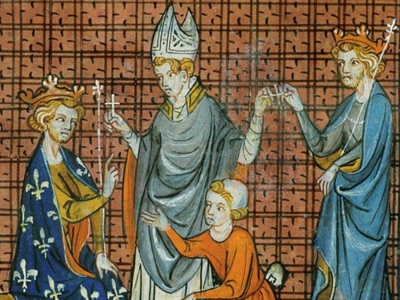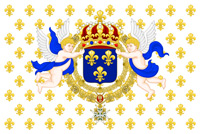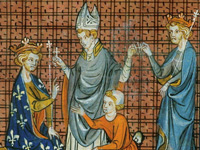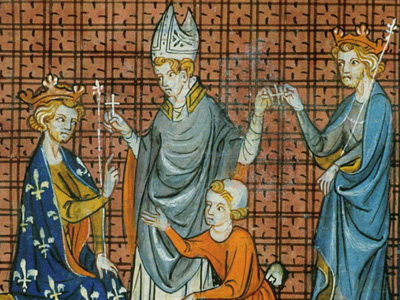Third Crusade (1189–1192)

Advances on Jerusalem, regicide, and negotiations
Following his victory at Arsuf, Richard took Jaffa and established his new headquarters there. He offered to begin negotiations with Saladin, who sent his brother, Al-Adil (known as 'Saphadin' to the Franks), to meet with Richard. Negotiations, which included an attempt to marry Richard's sister Joan to Al-Adil, failed, and Richard marched to Ascalon, which had been recently demolished by Saladin.
In November 1191 the Crusader army advanced inland towards Jerusalem. On 12 December Saladin was forced by pressure from his emirs to disband the greater part of his army. Learning this, Richard pushed his army forward, spending Christmas at Latrun. The army then marched to Beit Nuba, only 12 miles from Jerusalem. Muslim morale in Jerusalem was so low that the arrival of the Crusaders would probably have caused the city to fall quickly. Appallingly bad weather, cold with heavy rain and hailstorms, combined with fear that if the Crusader army besieged Jerusalem, it might be trapped by a relieving force, led to the decision to retreat back to the coast.
Advertisement

These books are available for download with iBooks on your Mac or iOS device, and with iTunes on your computer. Books can be read with iBooks on your Mac or iOS device.

These books are available for download with iBooks on your Mac or iOS device, and with iTunes on your computer. Books can be read with iBooks on your Mac or iOS device.
( Click image to enlarge)
Richard called on Conrad to join him on campaign, but he refused, citing Richard's alliance with King Guy. He too had been negotiating with Saladin as a defence against any attempt by Richard to wrest Tyre from him for Guy. However, in April, Richard was forced to accept Conrad as king of Jerusalem after an election by the nobles of the kingdom. Guy had received no votes at all; Richard sold him Cyprus as compensation. Before he could be crowned, Conrad was stabbed to death by two Hashshashin in the streets of Tyre. Eight days later, Richard's nephew Henry II of Champagne married Queen Isabella, who was pregnant with Conrad's child. It was strongly suspected that the king's killers had acted on instructions from Richard.
During the winter months, Richard's men occupied and refortified Ascalon, whose fortifications had earlier been razed by Saladin. The spring of 1192 saw continued negotiations and further skirmishing between the opposing forces. On 22 May the strategically important fortified town of Darum on the frontiers of Egypt fell to the crusaders, following five days of fierce fighting. The Crusader army made another advance on Jerusalem, and in June it came within sight of the city before being forced to retreat again, this time because of dissention amongst its leaders. In particular, Richard and the majority of the army council wanted to force Saladin to relinquish Jerusalem by attacking the basis of his power through an invasion of Egypt. The leader of the French The Kingdom of France is the historiographical name or umbrella term given to various political entities of France in the medieval and early modern period. It was one of the most powerful states in Europe since the High Middle Ages. It was also an early colonial power, with possessions around the world. Colonial conflicts with Great Britain led to the loss of much of its North American holdings by 1763. The Kingdom of France adopted a written constitution in 1791, but the Kingdom was abolished a year later and replaced with the First French Republic. contingent, the Duke of Burgundy, however, was adamant that a direct attack on Jerusalem should be made. This split the Crusader army into two factions, and neither was strong enough to achieve its objective. Richard stated that he would accompany any attack on Jerusalem but only as a simple soldier; he refused to lead the army. Without a united command the army had little choice but to retreat back to the coast.
The Kingdom of France is the historiographical name or umbrella term given to various political entities of France in the medieval and early modern period. It was one of the most powerful states in Europe since the High Middle Ages. It was also an early colonial power, with possessions around the world. Colonial conflicts with Great Britain led to the loss of much of its North American holdings by 1763. The Kingdom of France adopted a written constitution in 1791, but the Kingdom was abolished a year later and replaced with the First French Republic. contingent, the Duke of Burgundy, however, was adamant that a direct attack on Jerusalem should be made. This split the Crusader army into two factions, and neither was strong enough to achieve its objective. Richard stated that he would accompany any attack on Jerusalem but only as a simple soldier; he refused to lead the army. Without a united command the army had little choice but to retreat back to the coast.
HISTORY

RESOURCES
This article uses material from the Wikipedia article "Third Crusade (1189–1192)", which is released under the Creative Commons Attribution-Share-Alike License 3.0.
© Stories Preschool. All Rights Reserved.






